|
|
Crisis in Benin: Opinion leaders and religious gathered around Albert Tévoédjrè
un articulo por Ismail Kèko, La Nouvelle Tribune (slightly abridged)
A two-day roundtable opened Wednesday under the initiative of the
former Ombudsman, Albert Tévoédjrè. It took place at the
headquarters of the Pan-African Centre of Social Prospective-
Institut Albert Tévoédjrè (Cpps-iat) in the presence of Nouratou
Zato Yerima, representative of the Friedrich Ebert Foundation and
Alexandrine Dazogo UNFPA Representative as well as the Minister
responsible for social dialogue, Antonin Dossou, not to mention the
President of the CPPS-iat, Albert Tévoédjrè. 
Albert Tévoédjrè
click on photo to enlarge
This roundtable comes at a time when our country is on the brink of
paralysis in some of the essential basics of its functioning and our
hard-won democracy.
Policy makers, union leaders, social leaders, opinion and religious
leaders were all invited to the roundtable with the aim, according to
organizers, to allow them to share their views on the social situation
of the country. They should stimulate everyone's consciousness to
seek another path underpinned by concrete development actions
that will preserve the human rights to education and health
regardless of the political situation in the country. The challenge is
to to raise awareness of a real behavior of social responsibility.
At the opening session, Albert Tévoédjrè said that "... since this
morning, we spoke with candor, with eloquence and conviction, and
I find that there is hope. It's not millions of men who will change the
country! It is perhaps a hundred thousand people. It takes a
locomotive and people who are motivated and want to show that
example is better than knowledge. I am very impressed by what I
have heard. I hope we can keep in mind that we are at a crucial
moment of our history. There should be elections next year or soon.
We must demand that the questions you ask are in the program and
that you return to do battle with people that are elected at the
municipal, legislative and presidential levels, that will do what we
need. If not everyone, at least a few of you should remind them
what they promised ... ".
As for the Minister in charge of social dialogue, he said, "we must
privilege social dialogue upstream rather than waiting to curb crises
after they have arrived" . .
Three papers were presented to the audience during the first day.
The first relates to "safeguarding democratic gains in Benin"
presented by Pr. Joel Aivo. The second paper is entitled "the
enjoyment of fundamental human rights and the issue of freedom
of association" and the third is the "role of opinion leaders and
religious leaders in the achievement of social behavior that respects
the fundamental rights."
(Click here for a French version of this article)
|








|
DISCUSSION
Pregunta(s) relacionada(s) al artículo :
Can peace be guaranteed through nonviolent means?,
* * * * *
Comentario más reciente:
:
We have the advantage of an independent evaluation of the Nonviolent Peaceforce initiative in the Philippines conducted by Swisspeace. The evaluation is very favorable, although in the end, as one reads through it, gets the impression that such initiatives can help but cannot bring peace by themselves.
Here is the executive summary:
Nonviolent Peaceforce in the Philippines can look back at more than two years of unique, relevant contributions and constructive engagement in one of the most difficult, political and volatile, contexts to work in: Being the only international non-governmental organization working with and living in close proximity to the most conflict-affected population in Mindanao, NP in the Philippines was able to support and enhance local structures of cease-fire monitoring, early warning, cross-community dialogues, human rights protection, to offer civilian protection and help to reduce the high levels of community violence.
The accepted offer to NP in the Philippines in late 2009 by the conflict parties GRP and the MILF to join the International Monitoring Team1 (IMT) and its Civilian Protection Component is a direct expression and result of its successful contributions to non-violence and violence reduction of the last two years.
To keep up the important work of NP’s project in the Philippines in the years to come, it is essential to ensure that the activities and objectives of NPP are based on a strategically and conceptually sound footing. This seems even more important given that NPP is going through a remarkable consolidation and expansion phase at the time of report-writing.
The re-focus on its key mandate, strengths and strategic advantages in Mindanao gives NP the opportunity to further enhance its unique work in the area of nonviolence, peacekeeping and peacebuilding.

|
|









